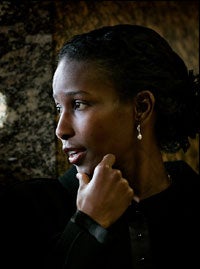Ayaan Hirsi Ali was born in Mogadishu, Somalia in 1969. The daughter of a political opponent of the Somali dictatorship, Ayaan Hirsi Ali grew up in exile, moving from Saudi Arabia to Ethiopia then Kenya. As a young child, she was subjected to female genital mutilation. As she grew up, she embraced Islam and strove to live as a devout Muslim. In 1992 Ayaan was married off by her father to a distant cousin who lived in Canada. In order to escape this marriage, she fled to the Netherlands where she was given asylum, and in time citizenship. In her early years in Holland she worked in factories and as a maid. She quickly learned Dutch, however, and was able to study at the University of Leiden. Working as a translator for Somali immigrants, she saw at first hand the inconsistencies between liberal, Western society and tribal, Muslim cultures. After earning her M.A. in political science, Ayaan worked as a researcher for the Wiardi Beckman Foundation in Amsterdam. She then served as an elected member of the Dutch parliament from 2003 to 2006. In 2004 Ayaan gained international attention following the murder of Theo van Gogh. Van Gogh had directed her short film Submission, a film about the oppression of women under Islam. The assassin, a radical Muslim, left a death threat for her pinned to Van Gogh’s chest. A visiting scholar at the American Enterprise Institute in Washington DC, Ayaan is currently researching the relationship between the West and Islam. Ayaan Hirsi Ali was named one of TIME Magazine’s “100 Most Influential People” of 2005, one of the Glamour Heroes of 2005 and Reader’s Digest‘s European of the Year for 2005. She has published a collection of essays, The Caged Virgin (2006), a memoir, Infidel (2007).

